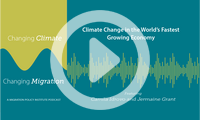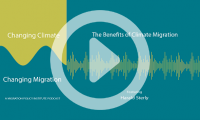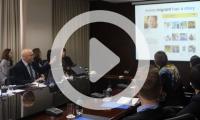Brain Drain & Brain Gain
Recent Activity

Guyana is a small country in South America that will be greatly transformed by the recent discovery of massive offshore oil reserves. This episode of Changing Climate, Changing Migration discusses how the world’s fastest growing economy is confronting environmental change, particularly with economic growth and proximity to troubled Venezuela likely to drive significant immigration.

Popular discussions usually frame climate change-induced migration negatively, often as a strategy of last resort. But migrating abroad can also be an effective way to build resilience against the impacts of climate change.

This briefing in Bangkok launches the MPI-IOM Issue in Brief, Shortage amid Surplus: Emigration and Human Capital Development in the Philippines, which reviews the impacts of the Philippines' successful labor export policy on skills development and human capital growth within the country. While Filipino migrant workers contribute significantly to the national economy with the remittances they send home (over US $27 billion in 2014), this reliance on exporting labor raises an important question: Has the nation’s focus on preparing workers to leave compromised human capital development at home?

A discussion on how governments and societies can retain their most valuable workers, turn emigration challenges into opportunities, and capture more of the potential benefits of emigration.

Marking the release of the 12th MPI-IOM Issue in Brief, this event in Bangkok examined the emerging trends in women’s labor migration in the Asia-Pacific region, and the related opportunities and challenges. The audio does not include opening remarks and begins with the author's presentation.
Pages
Recent Activity
En Nicaragua, una crisis política marcada por el creciente autoritarismo del Presidente Daniel Ortega ha desencadenado la mayor migración de la historia moderna del país, superando incluso las cifras registradas durante la Guerra Fría. Cientos de miles de personas han huido, incluidos intelectuales, artistas y académicos que se han dirigido a Costa Rica, Estados Unidos y otros países, provocando una fuga de cerebros. Este artículo brinda una visión general del éxodo y lo sitúa en un contexto histórico.


















Immigrants and the New Brain Gain: Ways to Leverage Rising Educational Attainment
The Field of Migration Studies Loses a Giant: Graeme Hugo